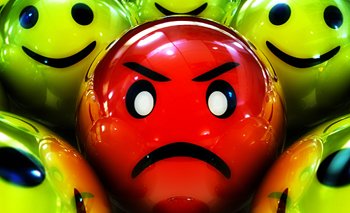Do you often get angry? Maybe your brain is only able to detect signs of hostility

Anger in our society has been listed as a negative emotion. When we were small we are taught that we should not get angry. However, the truth is that anger is a defensive emotion. It is present in conflict situations and is triggered when we think we've been treated unfairly, when we feel hurt or when something gets in our way.
In fact, anger is a powerful emotion that has a great dynamic effect. That is, gives us the motivation and drive necessary to fight what they consider unjust or threatening, in order to protect ourselves.
Therefore, anger itself is not negative , as long as we do not cling to it because in that case can be very harmful, even to ourselves. However, what it does that is harmful is aggressiveness.
What's the difference between wrath and aggression?
To understand the difference between anger and aggression one must bear in mind that anger, like all emotions, involves three types of responses.
1. Body. Our body is activated for defense or attack: the heart rate increases, breathing quickens, muscles tense and blood flow is triggered. It is a state of excitement that predisposes us to act impulsively because the amygdala takes control of the situation and can reach a result emotional hijacking , which means "off" control of the frontal lobes. In fact, a study conducted at the University of Chicago revealed that people who have anger problems show a hyperactivity of the amygdala, which leads them to respond impulsively, without thinking.
2. Cognitive / Emotional. This is our interpretation of the situation, the emotional value we give to it and the meaning it confirms. Thus, emotions are based on our thoughts, so when we interpret a situation as an obstacle, an injustice, abuse or disrespect, anger experience. Thoughts like " intolerable " or " how dare you treat me this way " become fuel for anger and increase the chances that lose control and react aggressively.
3. Behavior. When we experience anger, our instinctive behavior is to defend ourselves. Therefore, an internal energy that motivates us to destroy that "obstacle" is generated. Aggressiveness is one of the ways to express that anger, and also one of the most destructive. However, there are other behaviors that solve the problem without actual aggression.

Why do we lose control?
If you get angry and often lose control responding aggressively, it is likely that the problem is in the interpretation you make of the situation. The key may lie in the way your brain processes situations.
A study by neuroscientists at the University of Chicago has found that white matter in a brain region called the arcuate fasciculus has less density and less volume in people who suffer from intermittent explosive disorder than in "normal" individuals.
This region is responsible for connecting the frontal lobe, responsible for decision making, emotional control and the consequences of actions, with the parietal lobe, where the language and information from the senses is processed. In practice, it is the highway that connects these parts of the brain.
Moreover, the white matter is important because it favors the connection and transmission of information in the brain. Therefore, what these researchers have discovered is that the brains of people who are prone to anger connects differently.
That might be the reason why people who have anger problems tend to misinterpret the intentions of others in social interactions. They think that others are hostile, and draw the wrong conclusions about their intentions. This interpretation is further increased their anger.
It has also been appreciated that these people are not able to process all the details that occur in social interactions, such as language or a few extraverbal words. In practice, only they capture signals that reinforce their belief that the other person is challenging them. So they respond aggressively in situations that others would be neutral.
The problem in the connection between these lobes of the brain affect the processing of social situations, leading them to misinterpret the little clues that people send in social interactions.

Learning to manage anger
You getting angry is not negative. In fact, we must pay attention to the emotion and reflect on their origin. The key is to learn to manage our emotional, cognitive and behavioral responses.
So if you're angry and often lose control, the first step is to ask yourself if you're not on a biased interpretation of the signals sent by others. If we think that the world conspires against us, probably we only see the negative signals, therefore ignoring the positive.
In fact, it has been noted that people who get angry often tend to have large explosions of anger but the truth is that during the day they usually remain in a state of irritability and frustration, which makes them an actual time bombs ready to explode at the slightest stimulus.
thanks for reading :)
Transforming Anger Into Loving-Kindness
~ A Teaching by Yongey Mingyur Rinpoche
Enjoy! ;)
this video explains it well, thanks @bitfish